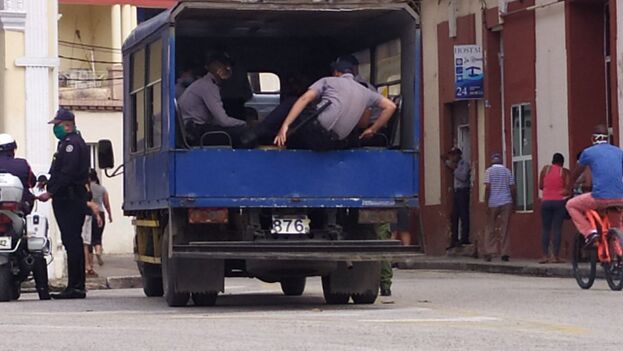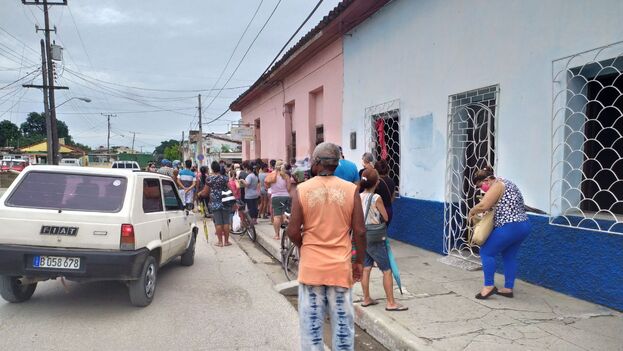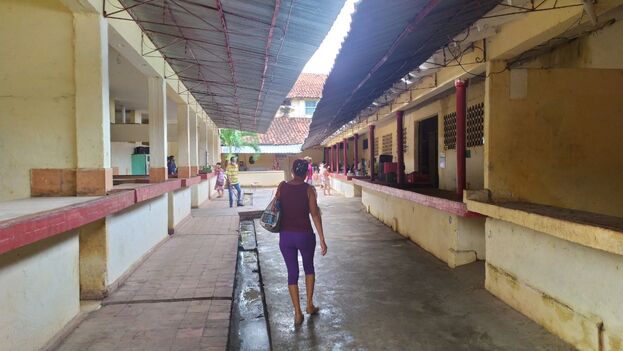
![]() 14ymedio, Mercedes García, Sancti Spíritus, 6 November 2020 — “I will trade a bottle of shampoo for a packet of coffee,” Mileidy Martínez, a resident of the city of Sancti Spíritus, wrote on her Facebook account. Three hours later, the police searched her house and took her into custody, according to a report to this newspaper from her family, who wereoutraged by the excessive official response.
14ymedio, Mercedes García, Sancti Spíritus, 6 November 2020 — “I will trade a bottle of shampoo for a packet of coffee,” Mileidy Martínez, a resident of the city of Sancti Spíritus, wrote on her Facebook account. Three hours later, the police searched her house and took her into custody, according to a report to this newspaper from her family, who wereoutraged by the excessive official response.
“They arrived, even checked her mobile phone and seized it,” a relative of Martínez tells 14ymedio. “Although they didn’t find anything else in the house, because it was really just one bottle of shampoo that she had, which she had been saving for a while and decided to trade it for coffee, and they took it anyway.”
In the same neighborhood, a baker was arrested during a police search after posting, also on a Facebook group, a photo of a case of beer he had for sale. “It seemed suspicious to them that he had a Hyundai car, but that is not prohibited and his family abroad helped him to buy it,” says a neighbor.
This occurs in a province that until a few months ago was considered one of the most economically dynamic on the Island because it has several of the most visited tourist centers, including the city of Trinidad. Without travelers and with a good part of the entrepreneurs lacking customers, they have taken to bartering, which the authorities call the black market, but it is vital so that the people of Sancti Spíritus can put food on the table.
But the police repression against those who engage in these small commercial exchanges has put the city on edge, a city that has also been trapped for weeks between the coronavirus outbreaks and limitations on mobility and purchases in state stores. To the monitoring of lines and markets is now being added to the scrutiny of social networks and instant messaging groups in search of For Sale announcements.
“They are imposing fines and taking people to jail for nonsense,” says a resident of Sancti Spíritus’s Colón neighborhood.” Here they hauled in a neighbor who was selling the rice that she had bought at the bodega [the ration store] and it was her own quota, she had not stolen it from anyone or diverted it from any state warehouse but they took her away and she is still in detention,” he adds.

“In the 90s, when I was young, Operation Flowerpot was launched and I remember that many people who had some financial solvency were taken to prison,” explains Wilfredo, self-employed, who until recently ran a thriving food business selling pizzas. But his business is closed now due to the pandemic. “At that time, if they pointed you out as a ‘flowerpot’ (rich), they would take everything from you.”
“I remember that in my neighborhood several residents were detained and people made the joke that the police were going to take away anyone who had more than two cans of condensed milk because that was already being a ‘flowerpot’,” he recalls. “Now that joke has become reality, because the other day I saw how an old man was taken prisoner for selling the tube of toothpaste that they give him on the ration book.”
With other names and other intensities, the raids against “hoarders” and the “new rich” have never stopped over the last two decades. The Government has promoted several raids after hurricanes, and after the damage left by the tornado that hit Havana in January 2019, along with the moments of greatest economic tension such as the so-called “temporary situation” announced more than a year ago.
Targets of these operations have been citizens who have what the authorities consider an excessive amount of construction materials, those who keep large volumes of food in their homes, but also those who frequently vacation in hotels or have bought a modern car with cash. These police actions have also encouraged people to protect themselves through deception.
In several of the city’s Committees for the Defense of the Revolution (CDRs), the authorities have warned their most active members that they have to help detect those who “are profiting from the needs of the people,” an exhortation that has also fueled witch hunts and personal revenge, as reported to this newspaper by several residents.
“In this block the president of the CDR pointed to a poor man who all he did was sit in the doorway and sell some of the avocados from the bush he has in the yard of his house,” comments Carmelo Gómez, a retired resident in the vicinity of Serafín Sánchez central park. “After hours of interrogation, they fined the poor old man 2,000 pesos, and his monthly pension is less than 300 pesos.”

Others rely on prudence, such as a 26-year-old who participates in several purchase-and-sale threads on WhatsApp with the pseudonym Pillo Manigüero. They know that it is necessary to be careful in these times of murmurs and denunciations, but they don’t stop “resolving* and looking for whatever it takes.” Between several friends they have created a decalogue of ‘rules’ to protect themselves from the police. “Never publish with your real name, not even on your personal Facebook account,” reads the first recommendation.
“To sell the merchandise, stay in a public place, with several entrances and exits. Arrive before the agreed time and check the site well for ‘toads’. Whoever catches you, deny everything and erase your WhatsApp history every day so they can’t prove anything against you.” The list of instructions goes on, as if the merchandise is something more dangerous than ketchup, coffee, or soaps.
*Translator’s note: The verb ‘to resolve’ is universal in Cuba to describe any situation where one does what is necessary to ‘resolve’ the nearly insurmountable problems of just getting by.
___________________
COLLABORATE WITH OUR WORK: The 14ymedio team is committed to practicing serious journalism that reflects Cuba’s reality in all its depth. Thank you for joining us on this long journey. We invite you to continue supporting us by becoming a member of 14ymedio now. Together we can continue transforming journalism in Cuba.
